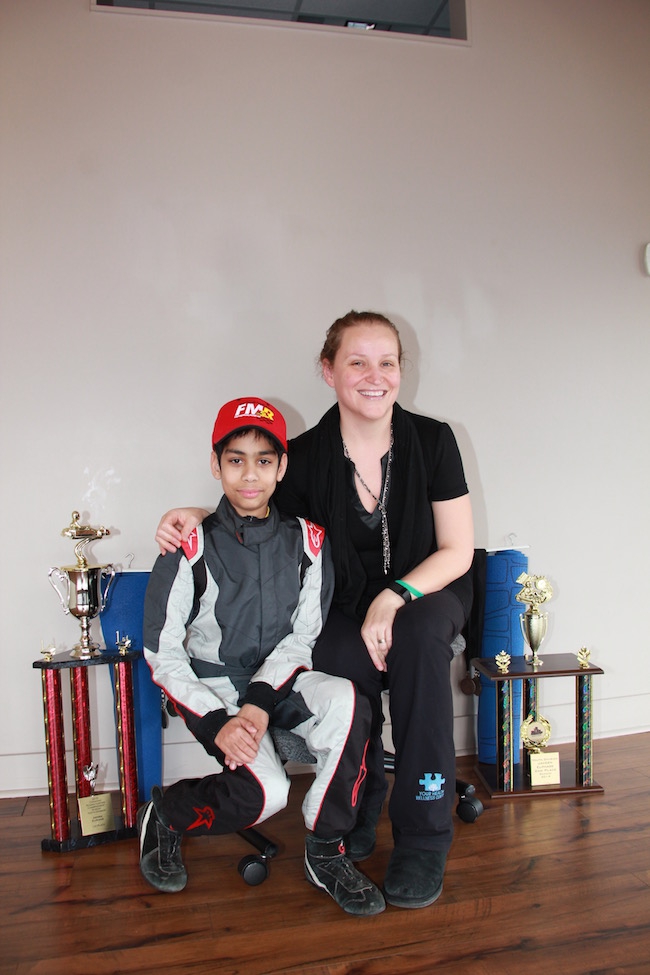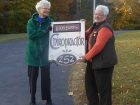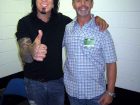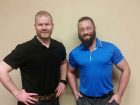
Above and beyond: Featuring some of Canada’s most inspiring chiropractors
Mari-Len De
Features Leadership ProfessionPresenting winners of 2015/16 Canadian Chiropractor Inspire Awards
 Dr. Carole Smith with her young karting champion patient Jayden Elphage
Dr. Carole Smith with her young karting champion patient Jayden Elphage The best way to explain how a bagpipe-playing DC from Oakville, Ont., became one of Canada’s most inspiring chiropractors is to tell the story of 11-year-old Jayden Elphage.
Jayden was born prematurely at 27 weeks weighing only two pounds. By the time he was four years old, Jayden had already been diagnosed with autism, cerebral palsy and G6PDD, had undergone brain surgery for a cochlear implant, and was wearing braces on both legs. Jayden’s parents met Dr. Carole Smith, chiropractor and clinic director at Your Health Wellness Centre in Oakville, Ont., in 2014.
Living with his conditions, Jayden was not able to engage in many activities or sports – until he discovered kart racing. His parents took him to the track one day to try it out and they knew right away their son had finally found a place where he could fit in. They decided then they would do everything in their power to support Jayden’s newfound passion. Entering his first season, with no previous karting experience and going up against “regular kids,” Jayden placed 27th out of 147 racers. In his second season, he was second place in his series. Last year, Jayden was the youth champion in the 2015 Canadian Rookie Karting Championship Series, ahead of at least 37 other kids.
Karting is one of the rare moments when Jayden can be just another “regular kid” – albeit, with excellent driving skills. So his parents had naturally wanted him to continue racing, but it comes with great expense. Smith, Jayden’s chiropractor, knew this and decided to do something about it.
“It was something that Jayden could really shine in,” Smith notes.
In October 2015, Smith and her colleagues at the clinic organized Jayden’s Joyride, a 5-km run fundraising event to support Jayden’s karting dreams. With support from the Oakville community, Jayden’s Joyride raised $7,000. Smith says they plan to make this an annual event.
With an undergraduate degree in psychology prior to attending CMCC, Smith has always had an interest in special needs children and women’s health. She is a trained doula, certified in Webster Technique, and has completed continuing education courses with the International Chiropractic Pediatric Association.
It is evident her passions have made an impact on her patients – particularly on Jayden’s quality of life.
Jayden lives with pain every day, according to Rehana Elphage, Jayden’s mother. Although he does not allow his pain to overcome him, Jayden still gets frustrated at times.
“Dr. Carole and Leah [massage therapist] are doing their best to help Jayden. I don’t think that he will ever be pain-free but at least now he has less pain.”
Smith says there is a lot chiropractic can offer in caring for kids with autism. Toe walking, for instance, is common in children with autism. Chiropractic can help with gait assessment and address joint restrictions and muscle tightness that can result from toe walking.
They could also be experiencing neck and back pain because of the way they walk and sit, but are not able to communicate that properly, Smith notes. “Just assessing them and treating them according to what you find to help give them some relief.”
Smith hopes to help raise public awareness on the benefits of chiropractic for special needs kids as part of a multidisciplinary approach to care. Although her practice sees a significant amount of special needs patients, she wants to be able to help even more.
She notes part of the relatively low awareness may be the lack of sufficient literature supporting chiropractic care for children with autism. And she is trying to change that through a planned pilot project investigating chiropractic care for dyspraxia in kids with autism.
Smith also offers her expertise to special needs athletes, volunteering at last year’s Parapan Am Games and again in May of this year at the Ontario Special Olympics. Her greatest aspiration is to be able to build a multidisciplinary practice that is solely focused on the treatment of special needs children.
“Working one-one-one with the kids, just seeing their special gifts and their interesting individual personalities – that’s my inspiration for treating these kids and that is what gives me the passion to do what I do,” Smith says.
Truth be told
For someone who did not know much about chiropractic starting out as a student at CMCC, Dr. Jeffrey Quon is doing an excellent job representing the profession in the medical research community today.
Quon, who also has a PhD in epidemiology, is a clinical associate professor in the Faculty of Medicine’s School of Population and Public Health at the University of British Columbia, and has been teaching and promoting evidence-based medicine since 2000.
Being one of this year’s recipients of the Canadian Chiropractor Inspire Award adds to this Vancouver DC’s long list of accolades, mainly from his research work.
“It was great fun to do the research, but even more fulfilling because I realize that every time I did something that was praised, it was really on behalf of the chiropractic profession as well. I felt like I was really representing the chiropractic profession in the university setting.”
Research and the pursuit of evidence-informed practice have been the foundation of Quon’s chiropractic journey. Not only does he endeavor to represent his profession through collaborative work outside his clinic, he also takes pride in serving as a mentor to young practitioners.
Entering his 30th year in practice, Quon is contemplating rebalancing many of his professional obligations to put more effort into his work as a researcher and advocate of evidence-based practice and, in the process, help further improve the public credibility of the chiropractic profession. One way of achieving this is through his volunteer work as an opinion leader for the Canadian Chiropractic Guideline Initiative (CCGI).
“There’s all this scientific evidence out there that’s already floating around,” Quon notes. “The Guidelines Implementation Group was charged with developing ways to get scientific information into a digestible format that allows hardworking, busy practitioners to actually apply the scientific information without it being so disruptive to their practices. That helps them, it would help patients and it also helps the public credibility of chiropractic.”
One of his personal goals is to create a network of like-minded chiropractors or “academic clinicians” as Quon likes to refer to them. They are clinicians with a passion for research, but have no real venue to exercise their academic interests. The CCGI’s support of practice-based research networks proves to be the ideal avenue to pursue this goal.
“The [CCGI] realized that one of the best ways to get people understanding science and using scientific information is to get them involved in the actual process of creating new knowledge – in other words, get them actively involved in research,” Quon explains.
His work with the CCGI and involvement with practice-based research networks is the latest chapter in Quon’s professional journey – and one that he hopes will assist other CCGI collaborators in establishing a legacy for the profession to benefit from.
If he can be instrumental in helping break down some of the barriers to chiropractic utilization, Quon would consider that one of his greatest accomplishments.
“I have long realized that if there is anything that you are dissatisfied with within the profession, you don’t really have a right to complain unless you are actually doing something to try to improve the situation. I’ve always felt that evidence-informed chiropractic has a lot to offer,” Quon says. “By systematically embracing both research and evidence-informed practice, chiropractors have a better chance at defining our own place of importance within society as opposed to allowing others to determine our destiny for us.”
Dynamic duo
Chiropractic doctors Erik Klein and Daniel Comeau may be two of the most sought-after chiropractors for athletes in New Brunswick. They both volunteer their time and clinical skills to care for athletes. Together, Klein and Comeau run The Town Chiropractor as CEO and COO, respectively, overseeing a network of clinics throughout New Brunswick.
Beyond their sports-focused interest, these two CMCC alumni share a strong passion for chiropractic and its potential to become a significant and recognized player in the bigger health care spectrum. That passion drives them to constantly engage in initiatives that serve this ultimate goal.
Klein sits on the board of New Brunswick’s Horizon Health Network, which oversees 12 hospitals, more than 100 medical facilities and some 13,000 employees – including 1,000 physicians – across New Brunswick. He was appointed to the board by the minister of health in 2012.
“It’s like I’ve been given a MBA in health policy because I now have an intricate understanding of how the health system works,” Klein says, adding, “I also have increased frustration of how the health system works as well.”
Notwithstanding his eye-opening experiences, Klein acknowledges that through the work they do at the Health Network “things are much better.”
“When I first showed up, all the talk was, ‘we need more MRI; we need more physicians; we need more family doctors,’ Now the strategic plan is formally in the direction of, ‘we need to keep people healthier; we need to keep them out of facilities; we need people to be more responsible for their health; we need to focus on preventative health strategies.’”
This “cultural shift” in public health policy may be paving the way for new initiatives that promote a more preventative and patient-centred approach to health care.
Over the last three and a half years, Kline and Comeau have been laying the groundwork for the establishment of a spinal triage program in New Brunswick – not unlike Ontario’s Interprofessional Spine Assessment and Education Clinics launched in November 2012.
New Brunswick’s planned spinal triage program aims to alleviate the current backlog of people waiting to see a spine surgeon for consultation and reduce unnecessary utilization of MRIs.
“Ninety-two per cent of referrals that spine surgeons are seeing are not surgical candidates. So [patients] are referred for an MRI and then they are sent to a spine surgeon, and they wait and they wait and they wait up to a year, just to be told that they don’t need surgery. They are not given any other options,” Klein explains.
The spinal triage program would screen patients and identify immediately whether they are surgical candidates or can be referred effectively and in a timely manner to a chiropractor or physiotherapist for conservative care.
Although the project has yet to officially launch – likely in the fall of this year – it has already succeeded in creating a platform for patient-centred interprofessional collaboration, Comeau says.
“It’s forward-thinking health care,” he points out. “The panel that is meeting to discuss this is everybody from orthopaedic surgeons to hospital administrators and nurse specialists, chiropractors, physiotherapists and physiatrists.”
Klein and Comeau give credit to the provincial associations in the province that saw the potential of the program and helped get the ball rolling. They are the New Brunswick Chiropractic Association, New Brunswick Physiotherapy Association and the Atlantic Neurosciences Network, which is a team of neurosurgeons in Saint John. With multistakeholder and multidisciplinary support, Comeau is confident the program will generate positive outcomes for the patients.
“If we can start to take a proactive approach and say, ‘yes, you are sick but maybe instead of waiting for two years [to see a surgeon], we will try to sort you into the appropriate group that you should be in rather than be in this big lump of people [on the wait list].’”
Comeau hopes the chiropractic profession takes more leadership roles in health care, whether in major sporting events or in the development of major health initiatives. The ultimate goal is to put chiropractic on the forefront of team-based, collaborative care settings – which also means bolstering the evidence that supports chiropractic benefits and promoting evidence-informed practice across the profession.
Comeau’s participation as an opinion leader with the CCGI is one way he is accomplishing that goal. He wants to help make it easier for practitioners to implement evidence-based clinical guidelines in their practices.
Pure and simple
He is virtually the chiropractic ambassador to the entertainment world because for more than 25 years, Dr. Murray Rosen of Calgary has been the chiropractor of choice for celebrities visiting his city. But what keeps him excited about his work is the everyday “miracles” he sees in his practice – at least, what his patients regard as such.
Graduated magna cum laude from Palmer College of Chiropractic in Davenport, Iowa, Rosen subscribes to the original tenets of chiropractic and runs a subluxation-based practice. Perhaps his strong principles and beliefs about what chiropractic is – and should be – are what gained the admiration of his patients. One, in particular, who nominated him for the Inspire Award.
“I have yet to see Dr. Rosen not to speak passionately about the greatness of chiropractic, no matter where he is or whom he is speaking with,” said patient Robin Craik in his submission. “Dr. Rosen has never swayed from the basic, original and authentic belief in chiropractic.”
In practice for 31 years, Rosen runs the Calgary Spine and Sport health and wellness clinic, providing chiropractic care for anyone who comes through his doors – and has never turned down a patient, especially not because of money.
“To some patients, [chiropractic care] is expensive nowadays, but I don’t compromise what we do here. I never say no,” Rosen says, who sees a wide range of patients and conditions, from sports injuries and workplace-related injuries to pediatric and family care and of course, the celebrities. He even set up a small arcade in his office to keep the little ones entertained.
Many of his patients grew up in his practice. He counts at least 11 of them even who went on to become chiropractors themselves, following in their doctor’s footsteps. One of them is now the chiropractor for the PGA Tour and the Dallas Stars. One of Rosen’s associate chiropractors at the clinic now had been a patient since the young man was seven years old.
The ability to influence others to pursue a profession that he cares deeply about, the opportunity to meet and provide treatment to some of his idols in the entertainment field – and knowing that they are “huge chiropractic supporters,” witnessing how chiropractic has made and is making a difference in the lives of his patients – these are just some of the reasons why, even after more than three decades in practice, Rosen still goes to work every day as excited about his chosen vocation as he was the first day he opened the doors to his clinic.
He recalls a recent patient – a six-month-old baby who was pooping only once every nine days. “The pediatrician told the mother that’s totally normal in a little baby. And the baby was cranky, not feeling good. I started adjusting the baby. The mother was just in on Wednesday, she says now every day the baby poops. That’s why I come to work every day.”
Rosen was not hesitant to express his opinion on the current state of the profession as well. He believes the chiropractic profession might be in danger of “losing its identity,” and fears there are too many “incongruities and inconsistencies” in practice, that it’s making the public “even more confused.”
He cites the recent decision, through a democratic vote, by members of the Alberta College and Association of Chiropractors, to initiate a move for the province’s chiropractors to petition to have limited drug prescription rights.
“We’re a drugless, surgery-less profession,” Rosen notes. “We’re very good at what we do in removing the nerve interference. We do not need drugs. Drugs killed 20,000 Canadians last year. I don’t want that on my resume.”
Hall of fame
Dr. Leslie Eaton has been practicing in Kentville, N.S., since 1951 until she retired last year, after 64 years of clinical practice.
Eaton is regarded as one of the pioneers of chiropractic in Eastern Canada, having witnessed the growth and development of the profession in that part of the country. She started her practice when there were only a handful of DCs in the east coast, was part of the group to lobby the Nova Scotia government for legal recognition of chiropractic as a profession, and was among the first to celebrate when the Nova Scotia Chiropractic Act was finally enacted in 1999.
Eaton has witnessed many milestones not just in her career but also in chiropractic in general. “It has been very helpful for us to have legal recognition,” she recalls. “We have been able to regulate our profession as we wanted.”
She began her practice at a time when chiropractic was not widely accepted and had often been the target of ridicule and smear campaign by some members of the medical community. But chiropractic has come a long way since.
“The medical profession has become educated – to a certain degree,” Eaton notes. “We do see quite a bit more cooperation between the two professions, for the benefit of the patients.”
Her passion for natural healing and her belief that the body is set up to heal itself are what kept Eaton in practice for more than six decades.
“She has given of herself unselfishly for the betterment of her community’s health,” says Dr. Stuart Kinsinger, who nominated Eaton for the Inspire Award. “Dedication, loyalty, passion and walking the talk of natural, vibrant health through chiropractic is what Dr. Eaton has done year after year, decade after decade.”
She may have folded her chiropractic tables and took down her shingle, but Eaton will always have a special spot for chiropractic, and offer some sage advice to new and not-so-new practitioners. “Be upfront with your patients,” she says. “I have never been a subscriber to ‘fake it until you
make it.’”
She also notes she is “troubled” that in certain aspects, chiropractors may be heading down a slippery slope, especially with some groups moving to expand the scope of practice to include limited drug prescription rights.
“In one of the western provinces I understand that the chiropractic profession is trying for legal right to prescribe painkillers. This troubles me. Chiropractic is a wonderful method of healing pain. I think that if I, as a chiropractor, felt that a patient needed additional help in the form of medication, let them go to their medical doctor or their pharmacist.”
At 90 years old, Eaton now lives in Halifax, and is intent to pursue new interests and explore more of the city’s rich heritage. She wants to further her education in humanities; she wants to explore the rich history and the natural beauty of Halifax that she now calls home; and, she wants to refinish some old pieces of furniture that have been in her father’s family for a very long time.
Eaton’s retirement is not the end of her book, but the beginning of a whole new chapter.
Print this page




